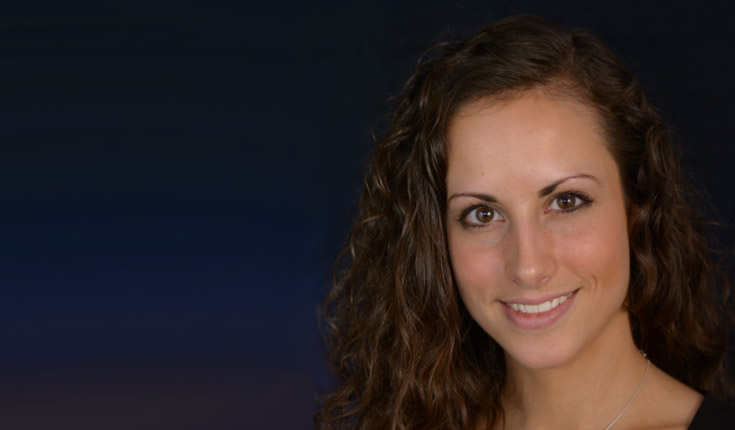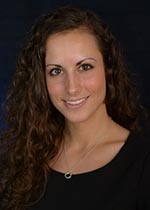Choosing a Part-time MBA Program


I’m only happy when I’m challenged.
Jackie DiMonte is a part-time Weekend MBA student at The University of Chicago Booth School of Business
I graduated from the University of Illinois at Urbana-Champaign with a degree in engineering and a concentration in control systems (a sort of electrical-mechanical blend, essentially robotics). I did some other things on campus: worked for the Math Department, joined a Fraternity, and was captain of the Varsity Cheerleading team. All of those experiences combined made me want a career outside of the engineering lab–that’s how I elected for a career in consulting!Now that I’m at Booth, I’m busier than I ever was. I’m still working full-time at Accenture and like to stay involved in our corporate citizenship and volunteer activities. At school, I just co-founded the Booth Technology Group for Evening and Weekend students. It’s an exciting addition to the Booth community and is already in high demand – tech is increasingly becoming a key driver in defining the way businesses function.
Booth also has this incredible program called the CBF (Chicago Business Fellows) for young professionals that includes weekly seminars that take place throughout the first quarter of school. I stay involved as an “alum” of that group – sitting on panels for applicants and acting as a program liaison.
Dream career: My dream career combines the strategic thinking of business with the rapid pace of technology. Personally, I’m only happy when I’m challenged, so I’d love to dive deeper into consulting where you’re always expected to be developing relevant skills, adapting to new situations, and collaborating with different groups of people.
Why Business School? First of all, I always knew I wanted to go back to school after undergrad, I just didn’t know quite what I wanted to study. A year or two ago, I came to the realization that my work involved a lot of figuring out how to meet my client’s objectives and not a lot of understanding why or how those objectives were chosen. I wanted to be more proactive in my work; not only did I want to understand why and how decisions are made but also become a player in the decision-making process. I felt my real-world industry experience was best supplemented with the theory taught and the skill developed at business schools.
I chose Chicago-Booth in part but for its reputation for solid foundation courses focused on timeless business theory (especially finance!) and in part for its incredible flexibility – we have no “required” courses so I can tailor my education to include core courses and electives relevant to me.
Best GMAT study tip? Block out a couple hours each week when you can turn off your phone, disconnect from email, and concentrate completely on studying. Building up endurance for taking the exam is key.
Before business school, I was: Crazy about working out, reading, and sketching.
When I’m not in class, you’ll find me: At the gym. I like to work out in the mornings – it’s a great way to start each day and gives me time in the evenings to meet with class study groups. I also am involved in a great mentorship program with local high-school juniors and seniors – it’s a good reminder of how tough high-school was. If I’m trying to relax, I like to sketch or paint (I really like watercolor). But usually, I’m working or studying!
Advice for anyone thinking about b-school? Take the time to understand why you want to go to b-school.
Think about: what do you want out of school? How is it going to enable your goals? Are there alternative options to get the same training or similar experiences? This exercise will help you come to a decision if b-school is the right investment for you. Also, you’ll have a better idea of what types of programs you want to target as well as a clear understanding of your motivations – it will help you when it comes time to writing those admissions essays!
I recommend reading the book Decisive: How to Make Better Choices in Life and Work by Chip Heath and Dan Heath–it helped me identify alternative learning options and validate that an MBA was right for me.
My remedy for pre-test nerves: Athletes train hard during the weeks approaching a big game, but a few days before, they begin to taper their training. I did the same while preparing for the GMAT. I knew if I tried to study like crazy or cram before the exam, I would stress myself out. I also knew that if I tried to do anything besides study, I’d start thinking about studying and become anxious. So, I made a list of things (limited number of notecards to review, a few problems to re-do) that I could do before the exam to keep my mind occupied. I kept the list limited to things I knew I could accomplish in a short period of time so that I did not feel overwhelmed. When I finished, I had a sense of accomplishment and felt confident that I could take on the exam.
On the day before your exam, you should: Make a plan for the next day and write it down for easy reference, so that you don’t have to think about it the day of. Consider things like: what is your travel route? What meals and snacks do you need? Will you need to stop for some caffeinated beverages once you’re in the building? Do you need to put together a “pump-up” (or relaxing) playlist for the waiting room?
How did you fit studying for the GMAT exam into your busy schedule? While studying for the GMAT, I was also working full time and attempting to finish my b-school applications. There was a lot going on so I had to use whatever free time I had efficiently. I had 45 minutes or so most weekday mornings when I used to read the paper that I turned into study time as well as larger blocks of time on the weekends. To use this time efficiently, I tried to identify the type of studying I could do in shorter periods of time (various quant questions or some verbal questions like sentence correction) versus the types that required long periods of focus (reading comprehension, any integrated reasoning) and match that to the time I had free during the week.
How well-prepared for business school do you feel, after studying for the GMAT exam? Studying for the GMAT prepared me for b-school in more ways than one. Most significantly, I learned how to use small bits of “down time” productively. Otherwise, I found quantitative skills review to be helpful (and necessary) for getting back into classes like econ. I was also able to use some of the sentence correction rules to improve my own writing and grammar use in work and school.
Why I Went From Engineering in Undergrad to an MBA
"After about a year or so of working, I realized I was doing all of this work to enable business processes without even knowing why people were executing these business processes or how they fit into the big picture."
How to Fit Your GMAT Prep and Applications into Your Schedule
"I would break down tasks into things that I could get done in a small amount of time versus things that I needed for entire afternoons."
What to Consider When Choosing a Part-time MBA Program
"I wanted to make sure that I had access to the same courses and professors in the part-time program as if I were taking courses in the full-time program."
What I Expected from My MBA & What I've Gotten from It
"The other thing I didn’t expect was how much I loved it. I thought I would get involved you know outside of courses and I thought I would enjoy the courses a lot, which I do, but I really love being there and didn’t expect to spend so much time getting invested."
